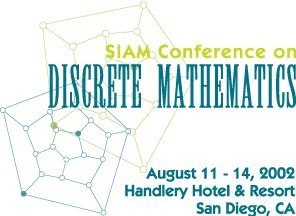

Sponsored by the SIAM Activity Group on Discrete Mathematics
Discrete mathematics is a branch of the mathematical sciences, with a wide range of challenging research problems and important applications in industry. Discrete mathematics has applications to all fields of computer science, and to the physical and biological sciences. It is used extensively in telecommunications, information processing and manufacturing, and many businesses and industries use techniques of discrete optimization to improve the efficiency of their operations.
Discrete mathematics is a dynamic field in both theory and applications. Researchers in discrete mathematics have established important connections with mainstream areas of pure and applied mathematics, and as a consequence, research techniques and problems are drawn from a wide range of different fields, including algebra, topology, geometry, probability, analysis, and logic.
The purpose of this conference is to highlight the major theoretical advances in the field, the development of new tools for discrete mathematics, and the most significant of the new applications of discrete mathematics to problems arising in industry and business. The conference also seeks to bring together participants from the many different environments where discrete mathematics is developed and applied.
The conference will bring together researchers in discrete mathematics, geometry, algebra, computer science, combinatorial optimization, and operations research. The wide scope of the conference should provide an excellent opportunity for sharing of ideas and problems among specialists in and users of discrete mathematics from academia, government and industry.
|
Fan
Chung-Graham,
|
University of California, San Diego |
|
Christopher Godsil,
|
University of Waterloo, Canada |
|
Jerrold Griggs,
|
University of South Carolina |
|
Laci Lovasz,
|
Microsoft Corporation |
|
Brendan McKay,
|
Australian National University, Australia |
|
Jeffrey Remmel,
|
University of California, San Diego |
|
Christophe Reutenauer,
|
University of Quebec, Montreal, Canada |
|
Frank Ruskey (Chair),
|
University of Victoria, Canada |
|
Carla Savage,
|
North Carolina State University |
|
Douglas Stinson,
|
University of Waterloo, Canada |
|
Douglas West,
|
University of Illinois, Urbana-Champaign |
The themes of the conference include, but are not limited to:
Minisymposia
A minisymposium consists of four 25-minute presentations, with an additional five minutes for discussion after each presentation. Prospective minisymposium organizers are asked to submit a proposal consisting of a title, a description (not to exceed 100 words), and a list of speakers and titles of their presentations using the Conference Management System available at:
http://www.siam.org/meetings/dm02/part.htm
A minisymposium organizer may also be a speaker in his/her minisymposium, usually the first presenter to give an expository talk. It is recommended that the minisymposium organizer make the first talk as tutorial as possible. Each minisymposium speaker should submit a 75-word abstract. Contributed minisymposia will be refereed by the Organizing Committee. The number of minisymposia may be limited to retain an acceptable level of parallelism in the conference session.
For further useful minisymposium organizer and participant information, please visit:
http://www.siam.org/meetings/resources/miniguid.htm
Deadline for submission of minisymposium proposals: ![]() April 4, 2002
April 4, 2002
Deadline for speaker abstracts: ![]() April 4, 2002
April 4, 2002
Contributed Presentations in Lecture or Poster Format
Contributed presentations in lecture or poster format are invited in all areas of discrete mathematics consistent with the conference themes. A lecture format involves a 15-minute oral presentation with an additional 5 minutes for discussion. A poster format involves the use of visual aids such as 8-1/2" x 11" sheets for mounting on a 4' x 6' poster board. A poster session is two hours long. Each contributor, either for a lecture or poster format, must submit a title and a brief abstract not to exceed 75 words.
Please submit contributed presentations in lecture or poster format using the Conference Management System available at:
http://www.siam.org/meetings/dm02/part.htm
Deadline for submission of contributed abstracts: ![]() April 4, 2002.
April 4, 2002.
For assistance with preparing a minisymposium or contributed paper, please visit our Meeting Resources Index.
| Deadline for submission of minisymposium proposals: | |
| Deadline for minisymposium speaker abstracts: | |
| Deadline for submission of contributed abstracts: |
The SIAM Activity Group on Discrete Mathematics focuses on combinatorics, graph theory, cryptography, discrete optimization, mathematical programming, coding theory, information theory, game theory, and theoretical computer science, including algorithms, complexity, circuit design, robotics, and parallel processing. This activity group provides an opportunity to unify pure discrete mathematics and areas of applied research such as computer science, operations research, combinatorics, and the social sciences.
For more information, visit the San Diego Convention & Visitors Bureau and the Handlery Hotel & Resort websites.